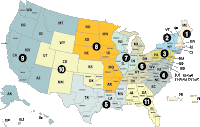In Inquiry Concerning A Judge, No. 09-01 Re: N. James Turner (09-1182), the Florida Supreme Court released an opinion and held "that Judge Turner is unfit to hold judicial office and that removal is the only appropriate sanction. For the reasons stated above, N. James Turner is hereby removed as a judge of Florida‘s Ninth Judicial Circuit." The opinion is interesting and details the facts leading to his removal. Articles can be read in the Orlando Sentinel (Florida Supreme Court permanently removes hugging judge); Miami Herald (State Supreme Court removes central Florida judge); and another in the Orlando Sentinel (Supremes remove Turner from the bench).
The court determined that the conduct was sufficient to warrant removal from the bench without even addressing all of the charges against the judge. The court stated "We need not reach the other specific charge—a charge regarding the solicitation of campaign contributions, which Judge Turner challenges on constitutional grounds." Chief Justice Canady, in an opinion concurring in result and joined by Justice Polston, would have reached the constitutional issue. Chief Justice Canady's opinion stated:
I would address the merits of Judge Turner‘s argument that Canon 7C(1)‘s prohibition of all personal solicitation of campaign contributions by judicial candidates violates the First Amendment of the United States Constitution, hold that prohibition unconstitutional, reject the Panel‘s finding of guilt regarding count 5, but nonetheless remove Judge Turner from office based on his other misconduct.
Chief Justice Canady continued:
Proper judicial restraint does dictate that when legislative or executive action is challenged on constitutional grounds, the courts should avoid the constitutional issue if the case can be decided on other grounds. This principle of judicial restraint has no proper application where the constitutional challenge is to a judicially adopted rule which trenches on constitutional rights. This Court was responsible for the adoption of Canon 7C(1) and is responsible for its continuing existence. To the extent that Canon 7C(1) infringes on speech rights protected by the First Amendment, this Court bears responsibility for the ongoing constitutional violation. When presented with a case which properly presents a constitutional challenge to a rule we have adopted, we should not decline to address it but should use the opportunity to ensure that we have exercised our rule-making power in a way that is consistent with constitutional requirements. If Canon 7C(1) violates the First Amendment, Florida state judges who wish to vindicate their First Amendment rights should not be required to seek relief in federal court or in state circuit court while the Florida Supreme Court remains silent.
After discussing, Carey v. Wolnitzek, 614 F.3d 189, 200 (6th Cir. 2010), Chief Justice Canady concluded:
I similarly conclude that Florida‘s interest in preserving the actual and apparent impartiality of Florida‘s judiciary is not significantly protected by Canon 7C(1). Canon 7C(1) completely chills a candidate‘s speech regarding contributions while providing only marginal protection against actual or perceived judicial bias. I therefore conclude that Canon 7C(1) encroaches on the free speech rights of judicial candidates in violation of the First Amendment of the United States Constitution.



0 comments:
Post a Comment